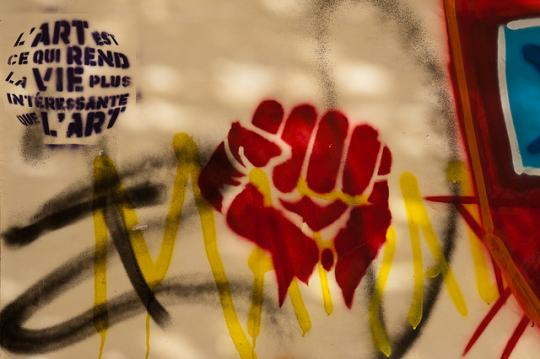 Riots broke out across Tunisia last weekend, as citizens reacted to the government’s latest efforts to trim its budget deficit. Officials are struggling to cut spending and increase revenues, all while responding to the demands of a citizenry increasingly dissatisfied with high unemployment and continued inflation.
Riots broke out across Tunisia last weekend, as citizens reacted to the government’s latest efforts to trim its budget deficit. Officials are struggling to cut spending and increase revenues, all while responding to the demands of a citizenry increasingly dissatisfied with high unemployment and continued inflation.
The economy grew by close to 3 percent last year, but it has not been enough to create new jobs. Making matters worse, many manufacturers and business owners have been forced to lay off workers in response, they say, to a rise in informal trade and “unfair competition”.
A big issue for the business community, informal trade has been equally as troublesome for the cash-strapped transitional government. According to recent World Bank research, the Tunisian government is losing a significant amount of public revenues-- duties, value-added tax and other taxes-- from informal trade along the Libyan and Algerian borders.
With increased civil unrest and a political picture still coming into focus following the 2011 revolution, the government also seems worried by the potential security threat posed by surging informal trade—specifically in weapons—as documented in a recent study published by the International Crisis Group.
But reducing informal trade can be extremely complex. To start, informal trade is difficult to define and even more to estimate. By using a combination of disaggregated official data analysis, as well as surveys at borders and in border towns, we estimate informal trade now totals at least 1.8 billion TND (or over US$1 billion) in Tunisia.
While this only accounts for a small proportion of the country’s total trade, it accounts for almost half of its trade with Libya, and there is ample evidence to suggest it is a significant portion of bilateral trade with Algeria as well. With Tunisia’s official trade statistics sketchy at best, it is likely that the level of informal trade is actually even greater than respective bilateral trade.
The reasons for this are manifold. Above all, our research found differences in subsidy and tax regimes on either side of the border to be the main driver behind the rise in informal trade. Drastically different prices provide lucrative incentives for smuggling. It should not come as a surprise, for example, that roughly one-quarter of all fuel consumed in Tunisia is informally imported from Algeria where it is one-tenth the price.
Beyond this, it is important to recognize that smuggling is symptomatic of systems that are not performing well. While often equated with lawlessness—the view preferred by traditional business interests—one must also recognize that informal trade fills certain market gaps. If fuel and other goods can be smuggled across the border with relative impunity, the economic incentive is enough to lure Tunisians—many of which are already struggling to find sources of income—into informal jobs as wholesalers, transporters, and various service providers.
This is particularly true in the border town of Ben Gardane. Here, around 3,800 people can be considered working in informal trade—around 20 percent of the active population—making it arguably the region’s largest economic sector.
And this is another key finding in the report. While it could be beneficial for the government to crack down on those dodging proper customs tariffs and duties, it could also lead to even more civil unrest at the local level. In regions struggling to develop more mature industries, the informal sector provides an income. And as Tunisian households’ purchasing power continues to erode, informal trade keeps consumer prices significantly lower on some products than if they were properly taxed at the border.
All of this puts local authorities in a difficult position. The government has already implemented tough penalties for those found to be breaking the rules, but strictly enforcing these penalties at the local level remains problematic. Evidence from other countries suggests that even if sanctions were increased on violators, as long as there are substantial differences in prices across borders (such as fuel), informal trade could continue.
So what can be done?
Strengthening controls with new equipment and infrastructure at the borders is unlikely to eradicate informal trade and corruption. A comprehensive policy approach is necessary-- one that limits the incentives for smuggling (by revising trade policy for instance) and more effectively monitors officials at borders.
An essential part of this approach will be to analyze the main drivers for specific products, including an intensive effort with neighboring countries to harmonize tax policies and subsidies. Without harmonizing prices and tax regimes at the regional level, there is little chance of slowing the growth of informal trade.
Finally, the country needs political stability and clear leadership. For many informal traders living along the remote borders, there is a sense of being forgotten by those in the capital. Until there is political consensus and a stronger state, there is little chance of containing informal trade.



Join the Conversation